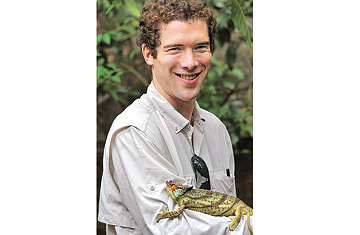
Bryan Walsh holds a Parson's chameleon.
Pretty nearly all the animal species that existed during Earth's history are gone. There may be at least 8 million species of life on the planet right now, but there are many millions more that exist only as fossils or in the mind's eye of zoologists. In this week's cover story for our annual Environment issue, Bryan Walsh writes that there have been five great waves of extinction in the planet's history--the most recent being 65 million years ago when the dinosaurs bit the dust. Now, he suggests, we may be entering the sixth. Some 1 in 4 mammals are under threat, and conservationists estimate that the pace of extinction is up to 1,000 times as great as it was before humans walked the earth. The great difference this time is that the cause is man-made. Climate change, according to some conservationists, could contribute to the dying out of 20% to 30% of all species on Earth before the end of the century.
Bryan's story grew out of a trip he took to the African nation of Madagascar last year. Madagascar is a living museum of animal diversity, a country the size of France that may have as many as 5% of all the species on Earth. But it is also an ecological "hot spot,"--a place of extreme biodiversity that is under great threat. Bryan was accompanied by primatologist Russell Mittermeier, who is president of Conservation International, one of the world's best-known wildlife-preservation groups. It is helping Madagascar grow an ecotourism industry that will help save not only the animals but also the people of that desperately poor and politically troubled nation. Saving animal species and changing the lives of people go hand in hand. As Bryan notes, we're animals too, and the more species living in an ecosystem, the healthier it is for all of us.
Speaking of change, I recommend Michael Grunwald's fascinating and exclusive story about how the President and his team are using behavioral science to facilitate change in America. Their strategy is based on the idea that social science can guide people to make better and healthier choices for themselves, whether it means buying that long-lasting lightbulb or shunning that Twinkie. Facilitating change harnesses some principles that behavioral scientists have known for decades: we're a lot more irrational than we realize; we avoid pain more than we seek comfort; we tend to stick with the status quo; and we like to conform with our peers. Michael got interested in this idea when he was reporting his January cover story on energy efficiency. He later discovered that during Obama's election effort, there was a secret consortium of the nation's leading behaviorists who were advising the campaign. Now the Administration boasts a number of senior members--including Budget Director Peter Orszag and regulatory-czar nominee Cass Sunstein--who are using these ideas to help change the economy and our behavior.
